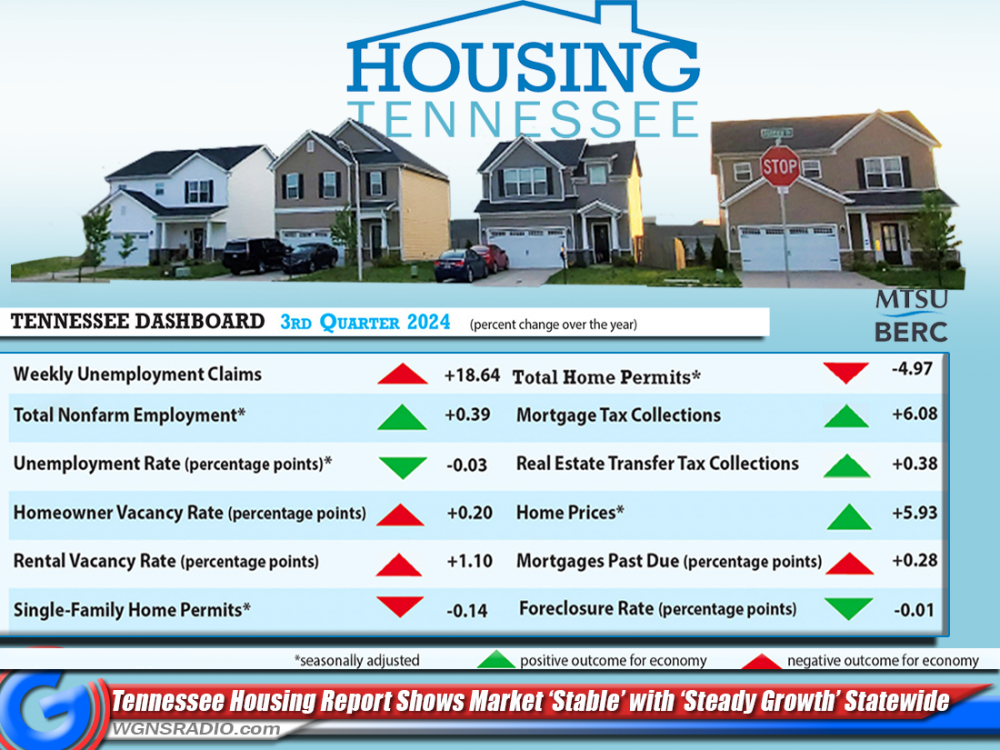MURFREESBORO, Tenn. — Tennessee’s housing market showed “steady growth” for the third quarter as home prices continue to rise throughout the state, though overall market strength varied across regions, according to the latest statewide report from Middle Tennessee State University.
“Despite this growth, mortgage delinquencies have slightly risen, indicating some financial strain on homeowners," said Murat Arik, director of the MTSU Business and Economic Research Center in the Jones College of Business and author of its statewide report for the second quarter of 2024.
“However, foreclosure rates have remained stable, suggesting that while there are challenges, they have not yet translated into significant foreclosures.”
Home prices rose by 1.1% from the previous quarter and 5.8% annually statewide, surpassing the national growth rates (up 0.45% quarterly and 4% annually.) Strong price increases were seen in markets like Knoxville and Kingsport-Bristol, while areas like Jackson and Morristown experienced price declines.
“There has also been a rise in the number of homes available for sale, yet rental vacancies have decreased, signaling less pressure in the rental market compared to previous quarters,” Arik noted.
See the full report and more detailed breakdowns at https://www.mtsu.edu/berc/housing/.
Other report highlights on home prices include:
- Strong growth areas: Some Metropolitan Statistical Areas saw robust price increases, with the Knoxville MSA (2.3% quarterly and 8.2% annually) and Kingsport-Bristol MSA (1.44% quarterly and 10.2% annually) showing the highest growth rates.
- Moderate growth areas: Other MSAs, such as Nashville MSA (1.05% quarterly and 5.4% annually) and Memphis MSA (0.80% quarterly and 2.44% annually), continue to exhibit moderate increases in house prices.
- Mixed and slower growth areas: Clarksville MSA shows modest growth (0.5% quarterly and 5.36% annually), Johnson City MSA (0.32% quarterly and 6.2% annually), and Chattanooga MSA has the least growth, with 0.16% quarterly and 6.4% annually.
- Declining areas: The Jackson MSA stands out with a negative growth trend, experiencing a 1.44% decline in house prices from the previous quarter, although it still saw a 6.36% annual increase. The Cleveland MSA and Morristown MSA also experienced quarterly declines of 1.4% and 1.1%, respectively.
Overall, Tennessee's housing market “is in a stable position with healthy real estate tax revenue from increased property transactions, though attention is needed to manage rising delinquencies and ensure the continued health of the housing sector,” Arik noted.
BERC’s report is funded by Tennessee Housing Development Agency, or THDA. The quarterly report offers an overview of the state's economy as it relates to the housing market and includes data on employment, housing construction, rental vacancy rates, real estate transactions and mortgages, home sales and prices, delinquencies and foreclosures.
The Business and Economic Research Center operates under the Jennings A. Jones College of Business at MTSU. For more information, visit http://mtsu.edu/berc/.
About THDA - THDA is the state’s housing finance agency and is committed to expanding safe, sound, affordable housing opportunities for low- and moderate-income Tennesseans. This is achieved through a robust home loan program, competitive funding for local nonprofit and municipal agencies, and the administration of nine federally funded programs. THDA publishes research on affordable housing and THDA programs and beneficiaries. THDA also coordinates state planning for housing through the Consolidated Planning process, annual Action Plans, and annual Performance Reports. See http://thda.org for more information.





